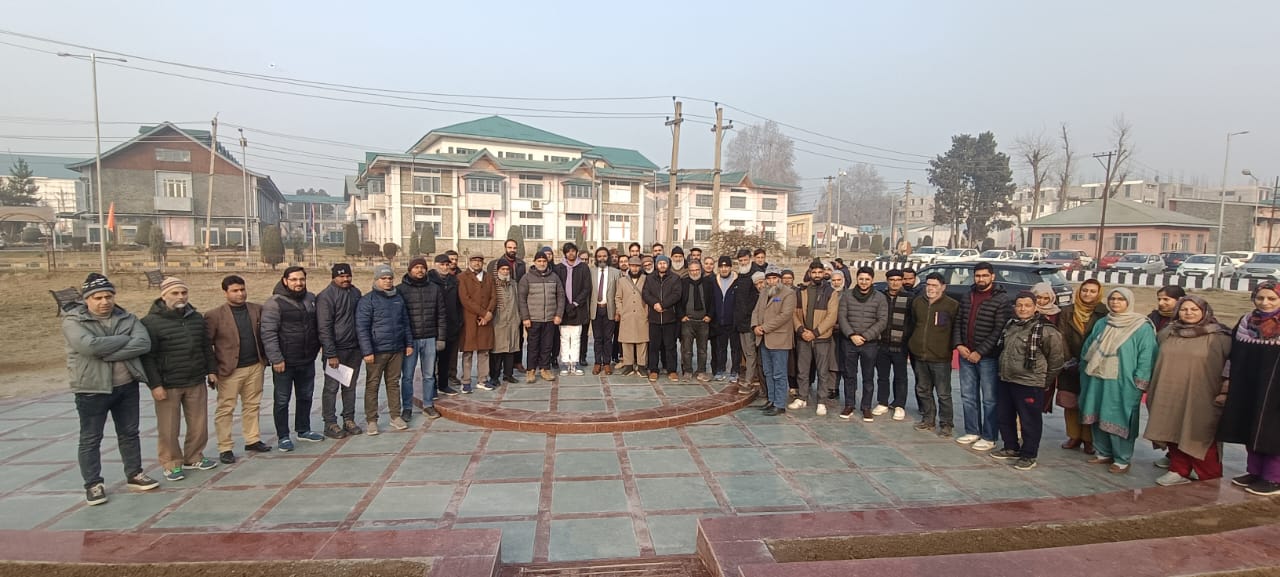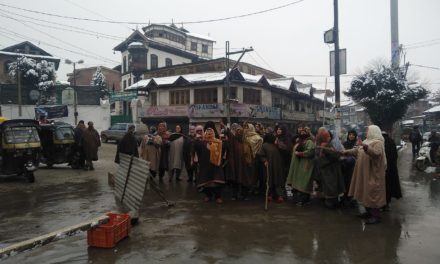![]()
Need to transform India into a developed nation while adopting sustainable practices: Director
Srinagar, Dec 28: Aligned with Prime Minister Narendra Modi’s visionary initiative aimed at propelling the nation towards progress and development, the National Institute of Technology (NIT) Srinagar organized a stimulating brainstorming session on Thursday under the banner of Viksit Bharat@2047.
The session was presided over by Director NIT Srinagar, Prof. Sudhakar Yedla, and was attended by all Deans, Registrar, Heads of Departments and Centres, faculty members, administrative staff, and other employees of the institution. The session was moderated by Dr. Kurella Swamy (Asst. Prof. Deptt. of Chemical Engineering).
Throughout the session, participating staff members engaged in a series of inquiries, delving into crucial aspects such as envisioning the characteristics of a developed Bharat in 2047, strategizing the necessary steps to achieve this goal, and exploring the individual and institutional contributions required to actualize Viksit Bharat@2047.
In his response, Prof. Sudhakar Yedla emphasized the focal point of the discussion, primarily addressing subjects spanning across the country, with a particular focus on women empowerment.
He underscored the significance of augmenting the women workforce, highlighting its current marginalization in comparison to their male counterparts.
“India has to evolve into a developed nation, a concerted effort towards women empowerment is essential. Secondly, the skilled workforce is a key factor in this transformation, advocating for strategic resource allocation towards this end. As we reach 2047, the Viskhit Bharat will have its workforce globally, participating in key components or projects worldwide,” Prof. Yedla said
The Director, emphasizing his role as an environmentalist, highlighted the need to envision per capita energy consumption, per capita emissions, and material consumption comparable to those of developed countries, including the USA and European nations.
He cautioned that adhering to the same guidelines would result in a significantly increased global burden in terms of energy, materials, and emissions.
To mitigate this impact, Prof. Yedla stressed the imperative of transforming into a developed nation while concurrently adopting sustainable practices.
“The urgent need for the country’s growth is imperative to address the gap between the poor and the rich. Many believe that India has entered a golden period where it can significantly deliver a boost to its rising economy,” the Director added.
Taking it forward, Prof. Yedla said NIT Srinagar plans to have deeper deliberations involving students to identify various innovative pathways towards Viksit Bharat.
“Jammu and Kashmir aims to be the frontrunner in the journey of Viksit Bharat and NIT Srinagar is striving hard to make meaningful contributions,” he added.
In response to the suggestions, Dean of Planning & Development, Dr. J. A. Bhat said there is a necessity to invest in a skilled workforce, noting the existing deficiency in India. He advocated for the establishment of training programs within our institutions to address this gap.
Dean Academic Affairs, Dr. Mohammad Shafi Mir highlighted the imperative to narrow the gap between academia and industry. He stressed the importance of NIT Srinagar taking a proactive stance, putting forth specific proposals or presentations to propel us towards a visionary India in 2047.
Head CSE, Dr.Mohammad Ahsan Chishti suggested that there is a need to focus on innovations, research, and Intellectual Property Rights (IPR). Placing a significant emphasis on these aspects, NIT Srinagar can actively contribute to technological advancements and secure its vital contribution in Viksit Bharat 2047.
In-charge Registrar Prof. Attikur Rehman proposed that each department within the institution should actively seek collaborations both domestically and internationally. This collaborative approach aims to create opportunities for students, Ph.D. scholars, and faculty to derive maximum benefit from such partnership, he added.
Dr. Yashwant Mehta emphasized the importance of incorporating local architecture and innovations to showcase them to the outside world.
He expressed the intention to integrate local solutions into the campus environment. The inclusion of elements of ethnic architecture within the campus to preserve and promote cultural diversity, Dr. Mehta said.
Similarly, Assistant Registrar, Direction Office, Mohammad Hazik proposed that apart from research and innovation being of prime importance, he also sees the critical aspect of social responsibility.
He highlighted the duty of the educational institution to instill a sense of responsibility among its staff and students, who act as representatives beyond the campus. There is a need to actively work in this direction,” Mr. Hazik said.
Dr. Ved Prakash Sharma emphasized the importance of collaboration with the local industry, aiming to benefit them with the institution’s expertise. While Dr. Farida Khursheed recommended a focus on educating the local population beyond the campus, particularly advocating for women’s empowerment and girl education.
























